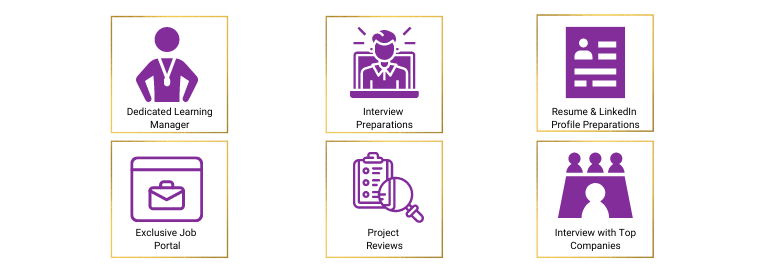Azure Administrator Infrastructure (AZ-104) Online Training
This learning path is designed to help you prepare for the AZ-104 Microsoft Azure Administrator exam. In this course you will learn how to manage Azure subscriptions, secure identities, administer the infrastructure, configure virtual networking, connect Azure and on-premises sites, manage network traffic, implement storage solutions, create and scale virtual machines, implement web apps and containers, back up and share data, and monitor your solution. Even if you don’t plan to take the exam, these courses and hands-on labs will help you get started on your way to becoming an Azure administrator.
In collaboration with
Online Class
Projects
Hands-On
n/a

30 Hrs Instructor-led Training
Mock Interview Session
Project Work & Exercises
Flexible Schedule
24 x 7 Lifetime Support & Access
Certification and Job Assistance



Course Benefits




Azure Administrator Infrastructure (AZ-104) Online Training Course Overview
- Manage subscriptions, accounts, Azure policies, and Role-Based Access Control
- Implement and manage Azure storage
- Deploy , manage and scale Azure virtual machines
- Configure and manage Azure virtual networks
- Configure and manage Traffic Management
- Manage and Secure identities with Azure Active Directory and users and groups
- Administer Azure using the Resource Manager, Azure portal, Cloud Shell, Azure PowerShell, CLI, and ARM templates.
- Configure virtual networks including planning, IP addressing, Azure DNS, Network Security Groups, and Azure Firewall.
- Configure intersite connectivity solutions like VNet Peering, virtual network gateways, and Site-to-Site VPN connections.
- Manage network traffic using network routing and service endpoints, Azure load balancer, and Azure Application Gateway.
- Implement, manage and secure Azure storage accounts, blob storage, and Azure files with File Sync.
- Administer Azure App Service, Azure Container Instances, and Kubernetes.
- Backup files, folders, and virtual machines.
- Monitor the Azure infrastructure with Azure Monitor, Azure alerts, Log Analytics, and Network Watcher.
- IT professionals who want to become Azure administrators
- IT professionals preparing for Microsoft’s AZ-104 exam
- Participants who have knowledge of other cloud platforms like AWS or Google cloud and want to explore Azure cloud service offerings
- General knowledge of IT architecture
- Basics of Cloud Computing
- Understanding of network configuration, including TCP/IP, Domain Name System (DNS), virtual private networks (VPNs), firewalls, and encryption technologies.
- Understanding of resilience and disaster recovery, including backup and restore operations.
- Understanding of on-premises virtualization technologies, including: VMs, virtual networking, and virtual hard disks
Mentors Pool follows a rigorous certification process. To become a certified AWS Solution Architect Associate , you must fulfill the following criteria:
- Online Instructor-led Course:
- Successful completion of all projects, which will be evaluated by trainers
- Scoring a minimum of 60 percent in the AWS Solution Architect Associate quiz conducted by Mentors Pool
This course is for Azure Administrators. Azure Administrators manage the cloud services that span storage, networking and compute cloud capabilities, with a deep understanding of each service across the full IT lifecycle. They take end-user requests for new cloud applications and make recommendations on services to use for optimal performance and scale, as well as provision, size, monitor and adjust as appropriate. This role requires communicating and coordinating with vendors. Azure Administrators use the Azure Portal and as they become more proficient they use PowerShell and the Command Line Interface.
Once a candidate passes the AZ-104 Microsoft Azure Administrator certification exam they will earn the Microsoft Certified: Azure Administrator Associate certification.
The Microsoft Certified: Azure Administrator Associate is part of a job-role based restructuring of the Microsoft certifications. This particular certification is geared towards candidates who are Azure Administrators using Microsoft Azure in their daily job.
Talk to Us
IN: +91-8197658094
In today’s Market Azure Junior Azure Administrator earn $80,000 and Senior Administrator earn $125,000 The Microsoft Certified: Azure Administrator Associate certification verifies that you have the skills to perform the job efficiently, and tests your ability to implement, monitor, and maintain Microsoft Azure solutions. Expect to see exams questions on compute, storage, and security management, as well as deploying virtual machines, configuring virtual networks, and managing Azure Active Directory.
Skills Covered
Fees
Online Classroom
- 30 Hrs of Instructor-led Training
- 1:1 Doubt Resolution Sessions
- Attend as many batches for Lifetime
- Flexible Schedule
Batches
Dates
Days
Timings
Enrolment validity: Lifetime
Login
EMI Option Available with different credit cards
Cart
Corporate Training
- Customised Learning
- Enterprise grade learning management system (LMS)
- 24x7 Support
- Enterprise grade reporting
Course Content
Module 01 – Python Environment Setup and Essentials
Module 01 – Python Environment Setup and Essentials0:51
Module 02 – Python language Basic Constructs
Module 03 – OOP concepts in Python
Azure Administrator Infrastructure (AZ-104) Online Training Course Content
Learning Objective:
Understanding Azure Active Directories & role-based access control (RBAC)
Topics Covered:
- create users and groups
- create administrative units
- manage user and group properties
- manage device settings
- perform bulk user updates
- manage guest accounts
- configure Azure AD Join
- configure self-service password reset
- create a custom role
- provide access to Azure resources by assigning roles at different scopes
- Interpret access assignments
Learning Objective:
Understanding subscriptions and governance & Secure Storage
Topics Covered:
- configure Azure policies
- configure resource locks
- Apply and manage tags on resources
- manage resource groups
- manage subscriptions
- manage costs
- configure management groups
Learning Objective:
Understanding Manage Storage Configure Azure Files and Azure blob Storage
Topics Covered:
- create an Azure file share
- create and configure Azure File Sync service
- configure Azure Blob Storage
- configure storage tiers
- configure blob lifecycle management
- export from Azure job
- import into Azure job
- install and use Azure Storage Explorer
- copy data by using AZCopy
- implement Azure Storage replication
- configure blob object replication
Learning Objective:
Understanding Automate deployment of virtual machines (VMs) by using Azure Resource Manager templates
Topics Covered:
- modify an Azure Resource Manager template
- configure a virtual hard disk (VHD) template
- deploy from a template
- save a deployment as an Azure Resource Manager template
- deploy virtual machine extensions
Learning Objective:
Understanding the configuration of containers & VMs
Topics Covered:
- configure sizing and scaling for Azure Container Instances
- configure container groups for Azure Container Instances
- configure storage for Azure Kubernetes Service (AKS)
- configure scaling for AKS
- configure network connections for AKS
- upgrade an AKS cluster
- create an App Service plan
- configure scaling settings in an App Service plan
- create an App Service
- secure an App Service
- configure custom domain names
- configure backup for an App Service
- configure networking settings
- configure deployment settings
Learning Objective:
Understanding the implementation of virtual networking
Topics Covered:
- create and configure virtual networks, including peering
- configure private and public IP addresses
- configure user-defined network routes
- implement subnets
- configure endpoints on subnets
- configure private endpoints
- configure Azure DNS, including custom DNS settings and private or public DNS zones
Learning Objective:
Understanding the secure access to virtual network and configuration if Load Balancing
Topics Covered:
- create security rules
- associate a network security group (NSG) to a subnet or network interface
- evaluate effective security rules
- implement Azure Firewall
- implement Azure Bastion
- configure Azure Application Gateway
- configure an internal or public load balancer
- troubleshoot load balancing
Learning Objective:
Understanding the Monitor and troubleshoot virtual networking
Topics Covered:
- monitor on-premises connectivity
- configure and use Azure Monitor for Networks
- use Azure Network Watcher
- troubleshoot external networking
- troubleshoot virtual network connectivity
Learning Objective:
Understanding Integrate an on-premises network with an Azure virtual network
Topics Covered:
- create and configure Azure VPN Gateway
- create and configure Azure ExpressRoute
- configure Azure Virtual WAN
Learning Objective:
Understanding Monitor resources by using Azure Monitor Implementing Backup and Recovery
Topics Covered:
- configure and interpret metrics
- configure Azure Monitor Logs
- query and analyze logs
- set up alerts and actions
- configure Application Insights
- create a Recovery Services vault
- create a Backup vault
- create and configure backup policy
- perform backup and restore operations by using Azure Backup
- perform site-to-site recovery by using Azure Site Recovery
- configure and review backup reports
Course Projects
Azure Virtual Machines
This projects has been included as a part of the training to allow you to manage scaling requirement using scala approach and use a custom image to create a virtual machine Also, automate the scaling of virtual Machine are required
Microsoft Azure Networking
In this Hand-on Project, learn to create a Vnet with multiple subnets & deploying virtual machine within it. Establishing a connection between these subnet & enabling the resource within them to communicate privately
Load Balancing and Network watcher
Successfully set up a load balancer for the backend resources. Also, It is suggested to ensure that the setting is such that s single frontend IP is exposed and a network watcher is available to generate alerts in the Azure Portal.
Course Certification
An Azure Administrator is responsible for implementing, monitoring, and managing Microsoft Azure solutions, which spans key services related to compute, storage, network, and security.
Microsoft Azure is a cloud computing platform that allows individuals and organizations to deploy web applications, virtual servers, and IT platforms. It also allows them to host databases, perform analytics, and store data.
Microsoft Azure certifications are role based and you can choose the one best matches your career interests. Here are some of the most sought-after Azure certifications:
- Microsoft Certified: Azure Administrator – Associate Exam AZ-104
- Microsoft Certified: Azure Developer – Associate Exam AZ-204
- Microsoft Certified Solutions Architect Technologies AZ-303
- Microsoft Azure Fundamentals (Exam AZ-900)
- Microsoft Azure Security Engineer (Associate Exam AZ-500)
A Microsoft Azure certification validates your cloud skills and demonstrates your expertise for a given role. It can help you improve your earning potential and stay ahead of your peers. It is predicted that around 80% of all enterprise workloads will move to the cloud by 2025. This means that there will be high demand for professionals who can develop cloud applications and manage cloud infrastructures, and a Microsoft Azure certification will help you gain these skills.
There are different type of Microsoft Azure Certification Courses and Exams to choose and learn, each course is different from the other and gives you specific knowledge about Azure. So not all Microsoft Azure Certification Courses will have the same course cost, it will be slightly different from each other.
Starting from June 2021, any role-based or specialty certification that you earn will expire after one year. Previously, these certifications had two years of validity.
Certification Course Reviews
Certification Course FAQs
Our Trainers are Microsoft certified (MCTs) and highly qualified with over 15 years of experience in training and are working in the domain.
A cloud administrator manages cloud-based IT resources. A cloud administrator can either work directly for a company’s cloud services organization or can also be a third-party organization contracted to administer the cloud-based IT resource service.
You may get access to Azure Free trial by visiting https://azure.microsoft.com/en-in/free/
-
After successful completion of the Microsoft Certified: Azure Administrator Associate Certification training, you will be awarded the course completion certificate from Mentors Pool.
The Microsoft Azure Administrator Associate certification is role-based and validates a professional’s ability to implement, monitor and maintain Microsoft Azure solutions, including major services related to compute, storage, network, and security.
This course is completely online, so there’s no need to show up to a classroom in person. You can access your lectures, readings and assignments anytime and anywhere via the web or your mobile device.






